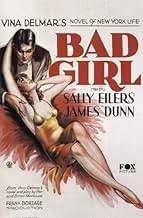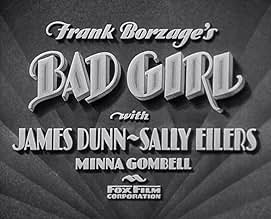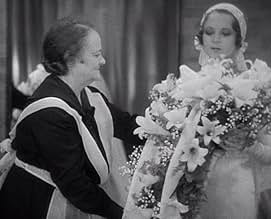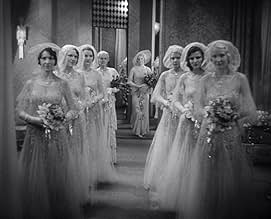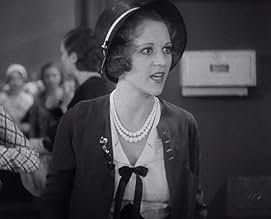PUNTUACIÓN EN IMDb
6,4/10
1,8 mil
TU PUNTUACIÓN
Un hombre y una mujer, escépticos ante el romance, se enamoran y se casan, pero su falta de confianza en el sexo opuesto atormenta su matrimonio.Un hombre y una mujer, escépticos ante el romance, se enamoran y se casan, pero su falta de confianza en el sexo opuesto atormenta su matrimonio.Un hombre y una mujer, escépticos ante el romance, se enamoran y se casan, pero su falta de confianza en el sexo opuesto atormenta su matrimonio.
- Dirección
- Guión
- Reparto principal
- Ganó 2 premios Óscar
- 6 premios y 1 nominación en total
Frank Austin
- Upstairs Tenement Neighbor
- (sin acreditar)
Irving Bacon
- Expectant Father
- (sin acreditar)
William Bailey
- Expectant Father of Twins
- (sin acreditar)
Sue Borzage
- Unknown
- (sin acreditar)
Jesse De Vorska
- Expectant Father
- (sin acreditar)
Bud Eilers
- Man Outside Candy Shop
- (sin acreditar)
Edward Hearn
- Male Nurse
- (sin acreditar)
Aggie Herring
- Seamstress
- (sin acreditar)
Claude King
- Dr. Burgess
- (sin acreditar)
Louis Natheaux
- Mr. Thompson
- (sin acreditar)
Sarah Padden
- Mrs. Gardner
- (sin acreditar)
Lorin Raker
- Male Nurse
- (sin acreditar)
Reseñas destacadas
A man and woman get married, she gets pregnant, and then the two of them spend the rest of the movie wondering if the other really wants to have a baby. They could just talk to each other about it I suppose, but then there wouldn't be a reason for this film's existence.
"Bad Girl" is a bit of a curio in that it won Oscars for Best Director (Frank Borzage) and Best Writing (Adaptation) at the 1931-32 Academy Awards, but who's even heard of this movie now? It's not very memorable, and it's a testament to the power of the Academy Awards, whether or not you personally give them any credence, that films like this are kept afloat in front of modern-day audiences based on the fact that they won some Oscars back in the day. That's certainly the motive for my seeking it out, whereas any number of other early talkies that are no better or worse than this one fade into obscurity.
James Dunn and Sally Eilers are pretty good, and talkies were still new enough that it's refreshing to find actors who knew how to act with sound as their medium. It's also fun to see movies from this time period because they give us a glimpse into what life was like during the Great Depression.
Many comments have said that the title is completely irrelevant to anything that happens in the movie. That's not entirely true. When Dunn first meets Eilers at Coney Island, they have a conversation where he mentions something about how everyone has both bad and good in them, and the idea that both husband and wife suspect the "bad" in each other drives much of their behavior throughout the rest of the film. But I do agree that the theme isn't explored very fully, and it is a misleading title.
In addition to the two Oscars it won, "Bad Girl" was nominated for Best Picture.
Grade: B
"Bad Girl" is a bit of a curio in that it won Oscars for Best Director (Frank Borzage) and Best Writing (Adaptation) at the 1931-32 Academy Awards, but who's even heard of this movie now? It's not very memorable, and it's a testament to the power of the Academy Awards, whether or not you personally give them any credence, that films like this are kept afloat in front of modern-day audiences based on the fact that they won some Oscars back in the day. That's certainly the motive for my seeking it out, whereas any number of other early talkies that are no better or worse than this one fade into obscurity.
James Dunn and Sally Eilers are pretty good, and talkies were still new enough that it's refreshing to find actors who knew how to act with sound as their medium. It's also fun to see movies from this time period because they give us a glimpse into what life was like during the Great Depression.
Many comments have said that the title is completely irrelevant to anything that happens in the movie. That's not entirely true. When Dunn first meets Eilers at Coney Island, they have a conversation where he mentions something about how everyone has both bad and good in them, and the idea that both husband and wife suspect the "bad" in each other drives much of their behavior throughout the rest of the film. But I do agree that the theme isn't explored very fully, and it is a misleading title.
In addition to the two Oscars it won, "Bad Girl" was nominated for Best Picture.
Grade: B
I finally tracked down Bad Girl. It had been on my list of wanna sees for years as it had won a major Oscar for Best Director- Frank Borzage.It was one of those tantalizing early talkies that had not actually been lost it had merely fell from sight. When I finally saw it last year at a Borzage revival, the film was a revelation.It was a pre-code delight about an ordinary couple, falling in love, struggling financially and having a baby etc.It most reminded me of the great silent film-The Crowd, which dealt with similar matters. What was especially fascinating to me was its depiction of "average" lower middle class types and how they lived and spoke in Depression America. The apartments... the slang, all of it, seemed real. It wouldn't be until the 50's neo realism hit American movies that we would see ordinary people depicted on the screen again, without condescension The movie has all the Borzage trademarks- love surviving against all odds, even an exciting if a little hokey climax.Unfortunately, the film has been slighted often in movie books,most likely, because the authors have never actually seen it. If it is ever shown again, try to see it. It's a wonderful peek at average city folks in Depression America.
This is a beautifully made, poignant drama about a young working-class couple starting their life together in the tenements of 1930s New York. This couple is incredibly normal and that's what makes this film so watchable. They're not gangsters, prostitutes, criminals, lawyers, or society girls down on their luck, they are just an ordinary couple without anything making them different to anyone else. What makes this so enthralling is therefore its story and specifically the storytelling.
The world these people live in is perfectly encapsulated with a scene early on when a neighbour dies on one floor of their tenement and a baby is born on another. Our hero sadly concludes: "Born on the second story... he'll probably die on the fifth. All his life, just to climb three flights of stairs." This however is a positive story, it shows that although The Depression was of course a struggle, even living in a one-room-apartment people survived, they went to work, had fun, got married, started families and found happiness. It was just life and that's what this picture is about even though in this case the couple aren't sure they're ideal for each other, aren't sure what they want, aren't sure that the other one doesn't love them and that makes us uneasy as to whether they will stay together. It's so well presented that very quickly we feel we know these people so are hoping desperately that they will make a go of it and that everything works out for them.
Inasmuch that it's about ordinary people, this is somewhat reminiscent of 1932's VIRTUE but the characters and the story and even the acting in this feel more natural and modern. It is perhaps more like the Kitchen Sink Dramas of the 50s and 60s such as LOOK BACK IN ANGER but set in America.
Why is it called "Bad Girl" and why has it got such a salacious poster? Obviously to get people to flock to the cinema and obviously to get people like me nearly a century later to watch it! Fox Films however knew that to avoid riots in their theatres when the customers realised the extend of the false advertising, they had to provide a genuinely top rate entertainment and that's exactly what they did. There is no "bad girl" in this film, that was the name of the book on which this was based but even in the book "bad girl" is just an insult which is thrown unjustly around, a term which our protagonist doesn't want to get branded with. Although this was made in what's referred to as "the pre-code era" the PCA made very sure that with this picture, the Hays Code was very heavily enforced. The eyes of the nation were on them because Vina Delmar's book had caused such an outcry, it was banned in Boston and was cited as containing: downright and unforgivable nastiness. Any suggestions or even hints that pre-marital sex was something which actually existed was heavily censored. The long process of consultation with the PCA lasted so long that Fox Films considered abandoning this entire project but eventually Miss Delmar's novel was considered suitably sanitised. We obviously can't ever know how a film of the original story would have been but even so, the changes certainly haven't destroyed the theme or spirit of the story. Possibly the challenges they posed have made a more interesting movie since Borzage has had to compensate for the lack of explicit content, language and sex with a visual flair unique to him.
The poster by the way does not seem remotely connected in any way with this film - it's good though isn't it!
The world these people live in is perfectly encapsulated with a scene early on when a neighbour dies on one floor of their tenement and a baby is born on another. Our hero sadly concludes: "Born on the second story... he'll probably die on the fifth. All his life, just to climb three flights of stairs." This however is a positive story, it shows that although The Depression was of course a struggle, even living in a one-room-apartment people survived, they went to work, had fun, got married, started families and found happiness. It was just life and that's what this picture is about even though in this case the couple aren't sure they're ideal for each other, aren't sure what they want, aren't sure that the other one doesn't love them and that makes us uneasy as to whether they will stay together. It's so well presented that very quickly we feel we know these people so are hoping desperately that they will make a go of it and that everything works out for them.
Inasmuch that it's about ordinary people, this is somewhat reminiscent of 1932's VIRTUE but the characters and the story and even the acting in this feel more natural and modern. It is perhaps more like the Kitchen Sink Dramas of the 50s and 60s such as LOOK BACK IN ANGER but set in America.
Why is it called "Bad Girl" and why has it got such a salacious poster? Obviously to get people to flock to the cinema and obviously to get people like me nearly a century later to watch it! Fox Films however knew that to avoid riots in their theatres when the customers realised the extend of the false advertising, they had to provide a genuinely top rate entertainment and that's exactly what they did. There is no "bad girl" in this film, that was the name of the book on which this was based but even in the book "bad girl" is just an insult which is thrown unjustly around, a term which our protagonist doesn't want to get branded with. Although this was made in what's referred to as "the pre-code era" the PCA made very sure that with this picture, the Hays Code was very heavily enforced. The eyes of the nation were on them because Vina Delmar's book had caused such an outcry, it was banned in Boston and was cited as containing: downright and unforgivable nastiness. Any suggestions or even hints that pre-marital sex was something which actually existed was heavily censored. The long process of consultation with the PCA lasted so long that Fox Films considered abandoning this entire project but eventually Miss Delmar's novel was considered suitably sanitised. We obviously can't ever know how a film of the original story would have been but even so, the changes certainly haven't destroyed the theme or spirit of the story. Possibly the challenges they posed have made a more interesting movie since Borzage has had to compensate for the lack of explicit content, language and sex with a visual flair unique to him.
The poster by the way does not seem remotely connected in any way with this film - it's good though isn't it!
Bad Girl is included in the new Murnau/Borzage and Fox collection,and kudos to them for making it available! Though an excellent little slice of life film from the Depression Era, I definitely wouldn't say that it compares with Borzage's timeless silent romances, though Borzage's recurrent theme of love conquering all is here to.The lead actors,Sally Eilers, and James Dunn, both do fine jobs, especially Dunn, who paints a very realistic portrait of a "regular Joe", decent kind of a guy. His performance rings true, and he later made a comeback, winning the Oscar for Best Supporting Actor in A Tree Grows in Brooklyn.(1945) This is the story of a young couple's struggle to make it through marriage, finances, and becoming parents. The background story of what was considered "making it" in a poor economy is especially pertinent today. Dunn's character, Eddie Collins, thought it was opening his own radio shop, providing his wife with an elaborately furnished apartment, and getting her the best doctor for her delivery. Not so different from what young couples are facing today! The film is sometimes a bit too wordy, but the slang of the time is a hoot! As one of Borzage's smaller films, it's worth a watch.
"Bad Girl" was a fun movie for a good 3/4ths of the film, then it became frustrating. This movie was an early version of miscommunication in a rom-com. Miscommunication seems to be a staple and an essential plot device in most rom-coms and it is ALWAYS irritating.
Dorothy Haley (Sally Eilers) was a pretty young lady who was tired of every guy making a pass at her. She found a rare bird when she met Eddie Collins (James Dunn) at a fair. Eddie not only didn't try to make a pass at her, he was a bit rude.
Dorothy liked it.
Apparently, she was interested in guys who weren't ostensibly interested in her. The more standoffish he was the more she was drawn in. She was smitten, and even though he didn't show it, Eddie was too.
The two got married in fast order and that's when all the miscommunication started. It was even worse once she got pregnant and was too scared to tell him. From there the communication between them just got to the point that each of them continued to make assumptions about the other. It was enough to drive you mad. "Just tell her what you've done!" I wanted to scream. "Just tell him you're pregnant!" is what I wanted to yell. Truthfully, most of the miscommunication was the fault of Eddie. He would never say what he was doing.
Eddie was concerned about money and being able to afford the finer things in life. He'd said over and over that kids would only upset his plans. When Dorothy said that there was more to life than just money, he responded, "Sure, there are a lot of things in life besides money, but you gotta have money to find them." But, as obsessed as he professed to be about money and opening his own business, he was really crazy about his wife and their prospective baby.
Between the two of them was Dorothy's friend, Edna Driggs (Minna Gombell). She was a go between at times who helped them out. She had a contentious relationship with Eddie, but it was very lighthearted. The two of them reminded me of Martin and Pam in the sitcom "Martin." They'd throw insults back and forth all day, but they never took it personally and never attacked each other to hurt deep, just to get the best quip in.
Edna consistently calmed Dorothy down when she got excited or upset about Eddie and his apparent flippancy. Eddie was working hard for his wife and unborn child, and while Dorothy should've assumed the best, Eddie should've been more forthright. To see the two have these absurd conversations because of holding back very simple information made the movie a little less enjoyable. The movie was great when they were dating, it became a bit of a chore once they were married.
Free on YouTube.
Dorothy Haley (Sally Eilers) was a pretty young lady who was tired of every guy making a pass at her. She found a rare bird when she met Eddie Collins (James Dunn) at a fair. Eddie not only didn't try to make a pass at her, he was a bit rude.
Dorothy liked it.
Apparently, she was interested in guys who weren't ostensibly interested in her. The more standoffish he was the more she was drawn in. She was smitten, and even though he didn't show it, Eddie was too.
The two got married in fast order and that's when all the miscommunication started. It was even worse once she got pregnant and was too scared to tell him. From there the communication between them just got to the point that each of them continued to make assumptions about the other. It was enough to drive you mad. "Just tell her what you've done!" I wanted to scream. "Just tell him you're pregnant!" is what I wanted to yell. Truthfully, most of the miscommunication was the fault of Eddie. He would never say what he was doing.
Eddie was concerned about money and being able to afford the finer things in life. He'd said over and over that kids would only upset his plans. When Dorothy said that there was more to life than just money, he responded, "Sure, there are a lot of things in life besides money, but you gotta have money to find them." But, as obsessed as he professed to be about money and opening his own business, he was really crazy about his wife and their prospective baby.
Between the two of them was Dorothy's friend, Edna Driggs (Minna Gombell). She was a go between at times who helped them out. She had a contentious relationship with Eddie, but it was very lighthearted. The two of them reminded me of Martin and Pam in the sitcom "Martin." They'd throw insults back and forth all day, but they never took it personally and never attacked each other to hurt deep, just to get the best quip in.
Edna consistently calmed Dorothy down when she got excited or upset about Eddie and his apparent flippancy. Eddie was working hard for his wife and unborn child, and while Dorothy should've assumed the best, Eddie should've been more forthright. To see the two have these absurd conversations because of holding back very simple information made the movie a little less enjoyable. The movie was great when they were dating, it became a bit of a chore once they were married.
Free on YouTube.
¿Sabías que...?
- CuriosidadesWilliam Pawley played the role of Dorothy's brother in the stage version, and reprises his role here in the film.
- PifiasAt 2:54, shadow of boom mic is visible across Dot's face.
- Citas
Dorothy Haley: I gotta go upstairs now. You see, my mother's dead, and my brother's boss of the house. He gets sore when I stay out late. You know, he's careful for me. But as Edna says, you can't watch a girl hard enough to keep her good if she don't want to be.
- ConexionesAlternate-language version of Marido y mujer (1932)
Selecciones populares
Inicia sesión para calificar y añadir a tu lista para recibir recomendaciones personalizadas
- How long is Bad Girl?Con tecnología de Alexa
Detalles
- Duración1 hora 30 minutos
- Color
Contribuir a esta página
Sugerir un cambio o añadir el contenido que falta

